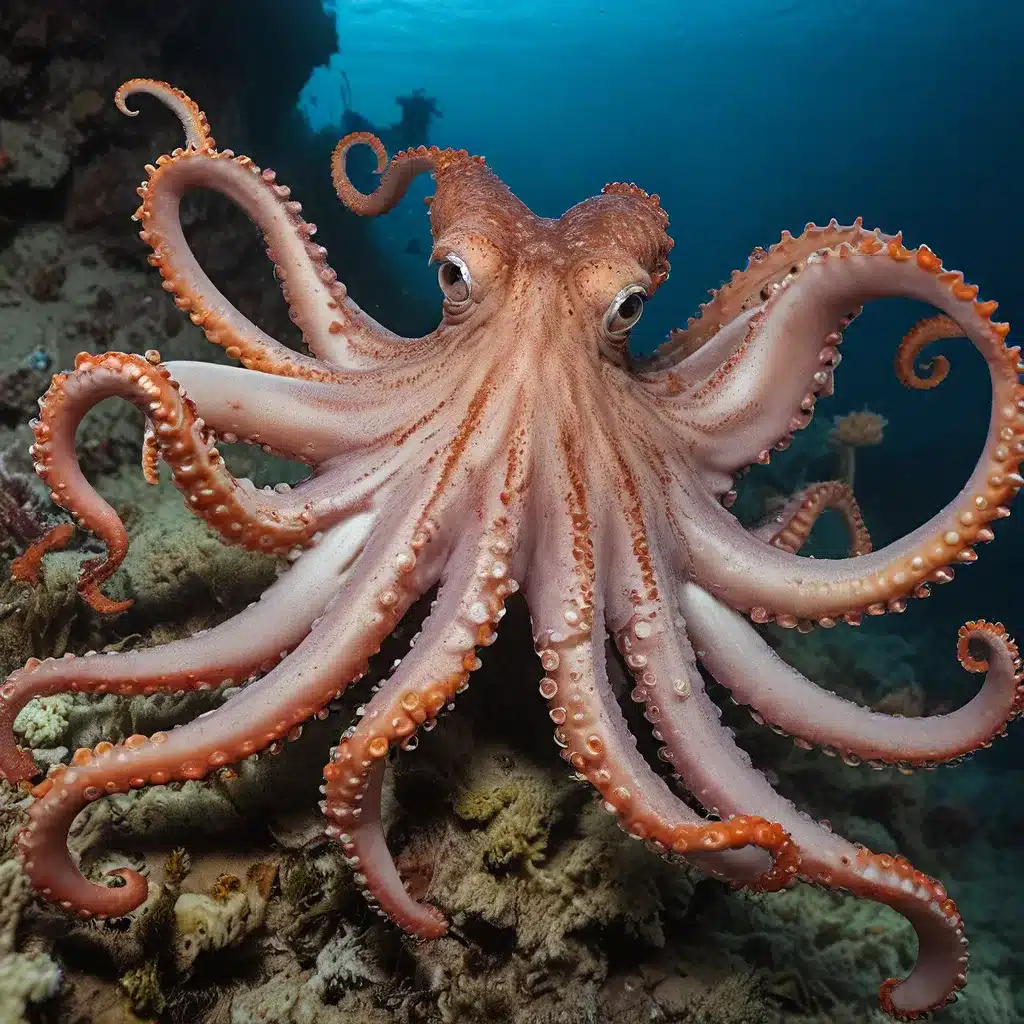
Unlocking the Mysteries of the Deep
Imagine a creature so captivating, so enigmatic, that it seems to defy all logic and reason. Welcome to the mesmerizing world of the octopus – a being that has captured the imagination of humankind for centuries. As I delve into the depths of this remarkable creature, I can’t help but feel a sense of wonder and excitement.
Octopuses are truly remarkable creatures, with their unique anatomy, intelligence, and captivating behaviors. Did you know that they have three hearts and blue blood? Or that they can change the color and texture of their skin to blend seamlessly with their surroundings? These are just a few of the fascinating facts that make the octopus such a remarkable and mysterious inhabitant of our oceans.
Exploring the Octopus’s Anatomy and Adaptations
One of the most striking features of the octopus is its otherworldly anatomy. With eight long, sinuous tentacles, the octopus is truly a creature unlike any other. But what’s even more remarkable is the intricate network of muscles and nerves that give the octopus such remarkable dexterity and control over its limbs.
Each of the octopus’s tentacles is lined with hundreds of suction cups, allowing it to grip and manipulate objects with incredible precision. But that’s not all – the tentacles are also highly sensitive, with the ability to detect and respond to touch, pressure, and even chemical signals.
Octopuses have a unique nervous system that is unlike any other creature on Earth. Instead of a centralized brain, they have a distributed nervous system, with nerve centers located in each of their tentacles. This allows them to process information and make decisions in a highly decentralized and adaptive way, making them incredibly intelligent and adaptable creatures.
But the octopus’s adaptations don’t stop there. These incredible creatures have the ability to change the color and texture of their skin to blend seamlessly with their surroundings, a process known as camouflage. They can even squirt ink to confuse and disorient potential predators, and some species can even change the shape of their body to mimic other creatures, like crabs or sea stars.
The Octopus’s Remarkable Intelligence
One of the most fascinating aspects of the octopus is its remarkable intelligence. These creatures have long been considered among the most intelligent invertebrates, with some species even demonstrating problem-solving skills and the ability to use tools.
Octopuses have been observed using tools to open jars, solve mazes, and even manipulate their environment to their advantage. They have also been known to display social behaviors, such as recognizing individual humans and even forming bonds with their caretakers.
But what’s even more remarkable is the octopus’s ability to learn and adapt. These creatures have been known to memorize the layout of their environments, and can even solve complex problems by trial and error. In one particularly impressive example, an octopus was observed opening a childproof bottle cap by unscrewing it – a task that even some humans struggle with!
The Octopus’s Mysterious Mating and Reproduction
One of the most intriguing aspects of the octopus is its mating and reproductive behavior. These creatures have a unique and often bizarre courtship ritual, with the male using a specialized arm called a hectocotylus to transfer his sperm to the female.
The mating process can be quite elaborate, with the male engaging in a complex dance to entice the female. Once the female has been fertilized, she will lay a clutch of thousands of tiny eggs, which she will fiercely guard and care for until they hatch.
Interestingly, the female octopus will often stop eating during this time, focusing all of her energy on protecting her eggs. Once the eggs hatch, the female will typically die, leaving the young octopuses to fend for themselves in the vast ocean.
The Octopus’s Culinary and Cultural Significance
In addition to its scientific and ecological significance, the octopus has also played a significant role in human culture and cuisine. These creatures have long been a staple of Mediterranean and Asian cuisine, with dishes like octopus salad, grilled octopus, and octopus sushi being popular delicacies in many parts of the world.
But the octopus’s impact on human culture goes far beyond just its culinary significance. These creatures have also been the subject of countless myths, legends, and works of art throughout history. From the kraken of Scandinavian folklore to the tentacled sea monsters of ancient Greek mythology, the octopus has long captured the imagination of humankind.
Conserving the Octopus’s Future
As we continue to explore and marvel at the incredible world of the octopus, it’s important to remember that these creatures face a number of threats from human activities. From overfishing to habitat destruction, the octopus and its fragile ecosystems are under constant pressure.
But there is hope. By raising awareness and supporting conservation efforts, we can help to protect these remarkable creatures and ensure that they continue to thrive in our oceans for generations to come. Whether it’s through supporting sustainable fishing practices, advocating for marine protected areas, or simply sharing our fascination with the octopus with others, we all have a role to play in preserving these mesmerizing inhabitants of the deep.
So, the next time you encounter an octopus – whether it’s in a restaurant, in a documentary, or in the wild – take a moment to appreciate the wonder and mystery of this truly remarkable creature. For in the octopus, we see a glimpse into the incredible diversity and complexity of life on our planet, and a reminder of the importance of protecting the delicate balance of our oceans.

